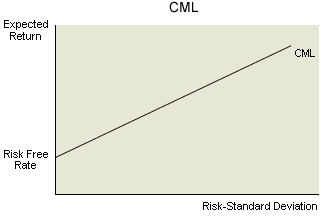As seen previously, adjusting for the risk of an asset using the risk-free rate, an investor can easily alter his risk profile. Keeping that in mind, in the context of the capital market line (CML), the market portfolio consists of the combination of all risky assets and the risk-free asset, using market value of the assets to determine the weights. The CML line is derived by the CAPM, solving for expected return at various levels of risk.
Markowitz' idea of the efficient frontier, however, did not take into account the risk-free asset. The CML does and, as such, the frontier is extended to the risk-free rate as illustrated below:
Systematic and Unsystematic RiskTotal risk to a stock not only is a function of the risk inherent within the stock itself, but is also a function of the risk in the overall market. Systematic risk is the risk associated with the market. When analyzing the risk of an investment, the systematic risk is the risk that cannot be diversified away.
Unsystematic riskis the risk inherent to a stock. This risk is the aspect of total risk that can be diversified away when building a portfolio.
Formula 17.10
Total risk = Systematic risk + Unsystematic risk |
When building a portfolio, a key concept is to gain the greatest return with the least amount of risk. However, it is important to note, that additional return is not guaranteed for an increased level of risk. With risk, reward can come, but losses can be magnified as well.










